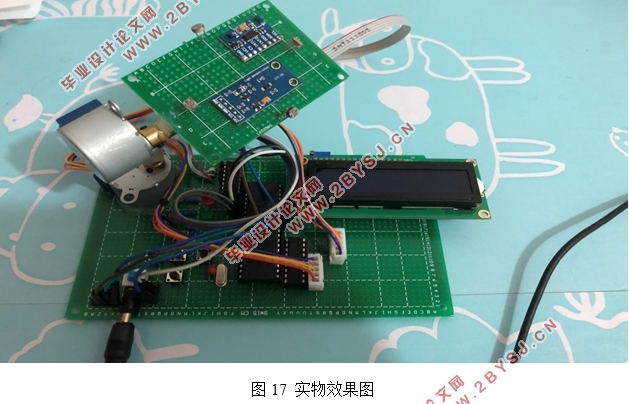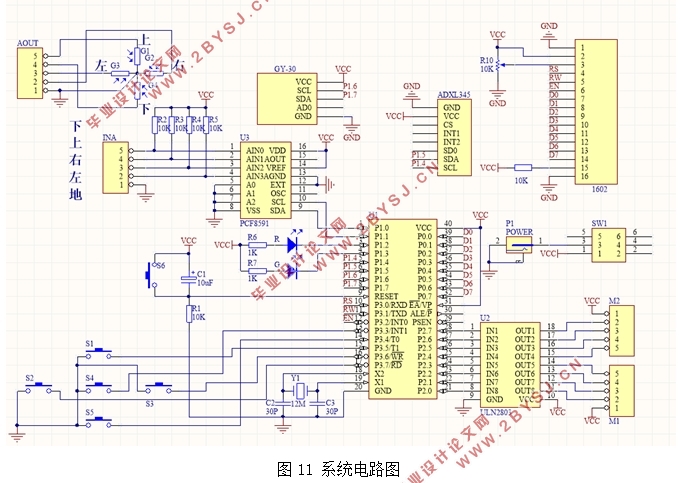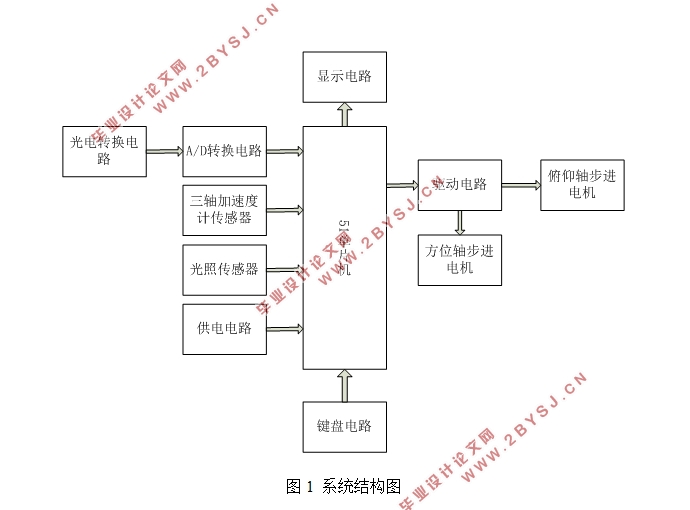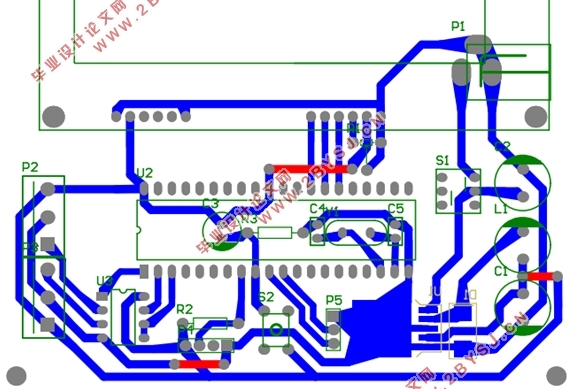基于单片机的太阳光跟踪系统设计(附实物图,系统电路图,程序清单)
无需注册登录,支付后按照提示操作即可获取该资料.
基于单片机的太阳光跟踪系统设计(附实物图,系统电路图,程序清单)(论文12000字)
摘要:传统能源日益减少,环境日益恶化,人类亟需一种新能源缓解能源危机,减少污染。太阳能便是一种非常好的选择,前景十分光明。但对太阳能的采集效率较差,阻碍了太阳能的进一步发展和实际投入使用。本论文设计了一种基于单片机的太阳光跟踪系统,使太阳能板一只垂直于太阳光,从而取得最大的光能。本设计是运用光敏电阻采集光信号,由单片机处理信号,然后控制步进电机,使受光面与太阳光垂直,并由光强度传感器和三轴加速度计传感器获得太阳光的光照强度和太阳光的高度角,再由液晶屏显示出来。此外,该装置还具有手动调整模式,可以人为控制受光面的方向,记录各个方向的光照强度并加以比较。该装置具备跟踪精确、简易实用等长处。
关键词: 单片机;光敏电阻;步进电机;三轴加速度计传感器;光强度传感器。
Solar Light tracking system based on single Chip Microcomputer
Abstract:With the decrease of traditional energy and the deterioration of environment, a new energy source is urgently needed to alleviate the energy crisis and reduce the pollution. Solar energy is a very good choice, the prospects are very bright. However, the poor collection efficiency of solar energy hinders the further development and practical application of solar energy. In this paper, a solar light tracking system based on single chip microcomputer is designed, so that a solar panel is perpendicular to the sun light, so that the maximum light energy can be obtained. In this design, Guang Min resistance is used to collect the optical signal, the signal is processed by single chip microcomputer, and then the stepping motor is controlled to make the receiving surface perpendicular to the sun light. From the light intensity sensor and the triaxial accelerometer sensor, the light intensity and the height angle of the sun light are obtained, and then displayed by the liquid crystal screen. In addition, the device also has a manual adjustment mode, which can artificially control the direction of the light surface, record and compare the light intensity of each direction. The device has the advantages of accurate tracking, simple and practical.
Key words: Single chip microcomputer; light dependent resistors; stepping motor; triaxial accelerometer sensor; Light intensity sensor.




目 录
1 绪论 1
1.1 研究的目的和意义 1
1.2 国内外现状 1
1.3 论文的主要研究内容 2
1.4 本章小结 2
2 太阳光跟踪系统设计方案 2
2.1 太阳光跟踪方式的选择 2
2.2 太阳光跟踪机构的选择 3
2.3 系统总体设计方案 3
2.4 本章小结 4
3太阳光跟踪系统的硬件设计 4
3.1 单片机最小系统的设计 4
3.2 光电转换电路的设计 6
3.3 A/D转换电路的设计 7
3.4 光强度传感器模块的设计 8
3.5 三轴加速度计模块的设计 8
3.6 键盘电路的设计 9
3.7步进电机及驱动电路的设计 10
3.7.1步进电机的选择 10
3.7.2步进电机驱动电路的设计 10
3.8显示电路的设计 11
3.9模式转换灯电路的设计 11
3.10系统电路的设计 12
3.11本章小结 12
4 太阳光跟踪系统的软件设计 13
4.1 keil uvision4的介绍 13
4.2 太阳光跟踪系统主程序的设计 13
4.3 A/D转换程序的设计 13
4.4 驱动电路程序的设计 14
4.5 测量太阳光高度角程序的设计 15
4.6 测量光强程序的设计 16
4.7 本章小结 17
5 太阳光跟踪系统的测试和数据分析 17
5.1 实物效果图 17
5.2 实验测试 17
5.2.1 室内测试 17
5.2.2 室外测试 19
5.3 数据采集和分析 20
6 结论 20
6.1 总结 20
6.2 不足和改进 21
参考文献 21
附录 23
致谢 29
